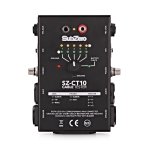How do you test if you have a problem with one of your RCA connection. I had an issue with no sound coming from the left speaker so I changed RCA cables and magic the left channel was singing magic again, but I thought if it didn't work I would not have known how to check the RCA connection.
Use your ohmmeter.
Measure between gnd and hot pins for short circuit.
Then look for loosen hot pin connection.
Measure between gnd and hot pins for short circuit.
Then look for loosen hot pin connection.
Here's some additional information on testing RCA interconnects using a multimeter:
Set your multimeter to a resistance (ohms or Ω) scale.
Test continuity between the centre pin at one end of the cable and the centre pin at the other end. The meter should read zero ohms. If it does not, there is a break in the centre conductor
Repeat for the outer ground shields at each end of the cable. Again the reading should be zero ohms.
Finally, test between centre pin and ground shield at one end of the cable. The reading should not be zero ohms! If it is zero ohms, there is a short between the centre conductor and the ground shield.
Set your multimeter to a resistance (ohms or Ω) scale.
Test continuity between the centre pin at one end of the cable and the centre pin at the other end. The meter should read zero ohms. If it does not, there is a break in the centre conductor
Repeat for the outer ground shields at each end of the cable. Again the reading should be zero ohms.
Finally, test between centre pin and ground shield at one end of the cable. The reading should not be zero ohms! If it is zero ohms, there is a short between the centre conductor and the ground shield.
I made a quick and easy simple RCA cable tester.
Used a small meter, a 1.5 volt AA cell, a resistor, switch, and a pair of RCA panel mount jacks - in a small project case.
Ya plug each end of the RCA cable into the set of jacks, flip the switch, and wiggle/flex the cable around some, while watching the meter.
If the meter stays at "0", good cable.
If it jumps at all, or goes full scale - bad cable, trash bin it.
Used a small meter, a 1.5 volt AA cell, a resistor, switch, and a pair of RCA panel mount jacks - in a small project case.
Ya plug each end of the RCA cable into the set of jacks, flip the switch, and wiggle/flex the cable around some, while watching the meter.
If the meter stays at "0", good cable.
If it jumps at all, or goes full scale - bad cable, trash bin it.
I made a quick and easy simple RCA cable tester.
Used a small meter, a 1.5 volt AA cell, a resistor, switch, and a pair of RCA panel mount jacks - in a small project case.
Ya plug each end of the RCA cable into the set of jacks, flip the switch, and wiggle/flex the cable around some, while watching the meter.
If the meter stays at "0", good cable.
If it jumps at all, or goes full scale - bad cable, trash bin it.
I stopped reading after "a small meter" 🙂
Pin to pin and GND to GND. Both should be approx. 0 Ohm.
I stopped reading after "a small meter" 🙂
Pin to pin and GND to GND. Both should be approx. 0 Ohm.
But see, some cables can be intermittent, and a simple probe test may not reveal that issue.
My little device shows if ANY changes in 0 ohms happens when flexing the cable, particularly where it enters the plug.
There is a truth in that I must admit. On the other hand I have had cables that didn't have interruptions in sound but flexing changed their resistance.
Psst... go digital. 1 or 0.
Psst... go digital. 1 or 0.
Last edited:
- Home
- General Interest
- Everything Else
- RCA connections

